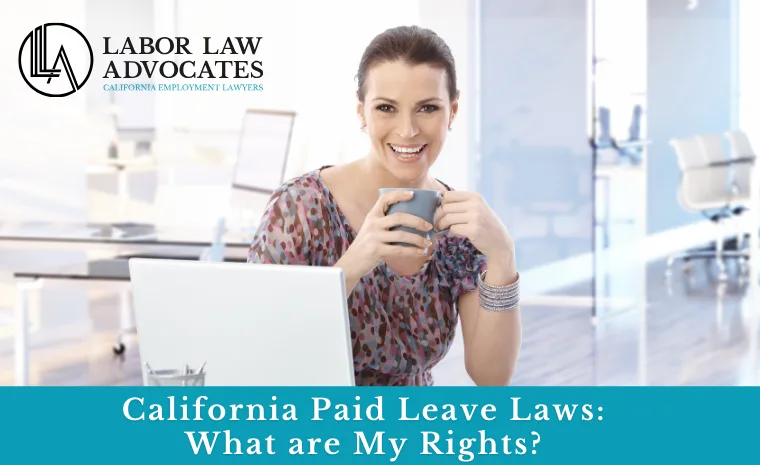California Paid Leave Laws: What are My Rights?
Paid and unpaid leaves are integral components of California’s labor laws. These leaves serve as a crucial safety net for employees, allowing them to balance their work and personal lives while ensuring job security.
In this article, we will look into the various aspects of paid and unpaid leaves in California in 2023. From family leave to sick leave, we’ll explore the rights and responsibilities of both employers and employees.
Understanding Leave Benefits in California
In California, the regulations concerning leave of absence are overseen by a combination of state and federal leave laws. California paid leave laws, however, are not universally applicable to all employees. They typically specify the eligible employees who are given such benefits and work protection. In certain cases, there may be distinctions made for specific roles, such as highly-compensated individuals, typically executives, concerning leave entitlement.
Are you not allowed to avail of your leave benefits?
Paid Leave
California, often at the forefront of progressive employment laws, understands the importance of paid leave in the lives of its workers. These policies offer essential support, allowing workers to maintain their financial security while addressing critical life events, be it personal illness, the arrival of a new family member, or the need to care for ailing loved ones.
Paid Sick Leave
The Sick Leave Law is one of the most vital benefits to employees in California. It allows employees to take time off from work when they are ill, need care for a health condition, or to care for a sick family member. In 2023, employees can have up to 24 to 72 hours of paid sick leave (PSL) per year. This paid sick time can be used for various purposes, including doctor’s appointments, illness, or preventive care.
Several California cities have implemented sick leave ordinances that offer more extensive sick leave time benefits than what state law mandates. Here are some of these city-specific PSL regulations:
- In Berkeley, you are entitled to 48 hours of PSL per year if their employer has fewer than 25 workers and 72 hours per year if the employer has 25 or more workers.
- Emeryville provides 48 hours of PSL annually for employers with 55 or fewer workers and 72 hours per year for those with more than 55 workers.
- Los Angeles mandates 48 hours (equivalent to 6 days) of PSL each year.
- Oakland offers 40 hours of PSL per year for employers with fewer than 10 workers and 72 hours per year for those with 10 or more workers.
- San Diego stipulates 40 hours of PSL annually.
- San Francisco extends 48 hours of PSL per year for employers with fewer than 10 workers and 72 hours per year for those with 10 or more workers.
- Santa Monica grants 40 hours of PSL per year for employers with fewer than 25 workers and 72 hours per year for those with 25 or more workers.
It’s a legal requirement that the remaining balance of your sick days be clearly displayed on your pay stub or included in a document accompanying your paycheck. Additionally, employers must prominently display a poster detailing your paid sick leave rights within the workplace.
Furthermore, in the event that you have been a victim of domestic violence, sexual assault, or stalking, PSL can be utilized for the following purposes:
- Seeking relief for yourself or your child, including obtaining a restraining order.
- Receiving medical attention for injuries related to the incident.
- Accessing services provided by a domestic violence shelter or a rape crisis center.
- Engaging in psychological counseling.
- Establishing safety plans to safeguard against potential occurrences of domestic violence, sexual assault, or stalking in the future.
Eligibility: An employee must have worked continuously for the same employer for a minimum of 30 days within a one-year period of time, and should complete a 90-day employment period before becoming eligible to apply this paid sick leave policy.
However, certain limitations under the Sick Leave Law could apply if:
- You are employed by the city, state, or U.S. government,
- You are governed by a collective bargaining agreement,
- You serve as an in-home supportive service provider, or
- You hold a position with an air carrier.
Paid Family Leave
Paid Family Leave (PFL) serves as a crucial support system for individuals in California who require time away from work due to significant life events.
California employees have the option to utilize Paid Family Leave (PFL) for:
- Establishing bonds with a recently born baby or a foster child placed through adoption or foster care during the first year after birth or placement.
- Providing care to a seriously ill child, parent, parent-in-law, grandparent, grandchild, sibling, spouse, or registered domestic partner.
- Participating in a qualifying event stemming from a spouse or domestic partner’s military service deployment.
Eligibility: You could qualify for PFL if you experience wage loss due to needing family leave. If eligible, you can receive payments for up to eight weeks, typically amounting to 60 to 70 percent of your weekly earnings from five to eighteen months before your claim’s start date.
Paid Time Off
While there is no legal requirement under the California law to provide paid time off (PTO) to employees, employers may offer this benefit within their policies. PTO combines sick leave, vacation, and personal days into one bank of hours that employees can use for any purpose. Employers typically determine the accrual and usage of PTO based on their policies.
Eligibility: To qualify for paid vacation leave benefits to employees in California, they must meet specific eligibility criteria. Generally, employees who have worked for an employer for at least 30 days within the previous 12 months are eligible for paid sick leave and paid family leave. However, PTO eligibility can vary depending on the employer’s policies.
Kin Care Law
In accordance with California’s Kin Care leave law, employees have the flexibility to utilize up to half of their accrued sick leave to provide care for their close relatives, including:
- Children
- Parents
- Spouses or registered domestic partners
- Siblings
- Grandparents
- Grandchildren
Notably, Kin Care isn’t restricted solely to serious illnesses; it can also be applied to minor ailments such as common colds or the flu.
Domestic Violence Leave
Employees who are victims of domestic violence, sexual assault, or stalking are entitled to a domestic violence leave to address their situation, seek medical attention, or attend legal proceedings.

Unpaid Leave
While paid leave offers essential benefits, unpaid leave is equally important for employees facing more extended or challenging circumstances.
Family and Medical Leave Act
The Family and Medical Leave Act (FMLA) is a federal law that provides eligible employees with up to 12 weeks of unpaid leave in a 12-month period for specific family or medical reasons. While this law applies nationwide, California has its equivalent.
California Family Rights Act
The California Family Rights Act (CFRA) mirrors the FMLA but applies to smaller employers with at least 5 employees. It provides eligible employees with unpaid leave for family and medical reasons.
CFRA also grants employees the opportunity to take leave when there is a qualifying necessity linked to the active duty or call to active duty of their spouse, domestic partner, child, or parent in the United States Armed Forces.
Eligibility for Unpaid Leave
To qualify for unpaid leave under FMLA or CFRA, employees must have worked for their employer for at least 12 months and accumulated 1,250 hours of service in the previous year.
How to Request Leave
Requesting leave is a straightforward process. Employees should inform their employers as soon as possible, providing the necessary documentation when required. Employers are generally required to grant the leave request unless there are legitimate reasons not to.
Employee Rights and Responsibilities
Employees also play a crucial role in ensuring that the leave process goes smoothly. Here are some key rights and responsibilities employees should be aware of:
- Notice: Employees should provide reasonable notice to their employers when requesting leave. In cases of unforeseen circumstances, notice should be given as soon as possible.
- Documentation: Depending on the type of leave, employees may need to provide documentation to support their request. For instance, medical certificates may be required for medical-related leaves.
- Rights to Return: Under California law, eligible employees have the right to return to their previous position or an equivalent one after taking leave. Employers must not discriminate against employees who exercise this right.
Legal Disputes and Mediation
Sometimes, disputes can arise between employers and employees regarding leave policies or their implementation. In such cases, mediation is a valuable tool for resolving conflicts amicably. Mediation involves a neutral third party who helps facilitate discussions between the two parties, aiming to find mutually acceptable solutions.
If mediation doesn’t resolve the issue, employees have the right to file complaints with the California Labor Commissioner’s Office. Employers should take these complaints seriously and cooperate with any investigations. Additionally, employees may consult with an experienced employment lawyer to help them understand their rights better.
Always denied when applying for leave benefits?
Staying Compliant with Changing Laws
California’s employment laws are subject to change. Employers should stay informed about any updates to leave laws and promptly adjust their policies to remain compliant. Ignorance of the law is not a valid defense in case of disputes or legal actions.
FAQs on California Paid Leave Laws
Can an employer deny paid sick leave?
In most cases, employers cannot deny paid sick leave if employees meet the eligibility criteria and provide appropriate notice.
Can an employer terminate an employee on leave?
Generally, employers cannot terminate an employee on approved leave. Doing so can lead to legal consequences.
Is it possible for my employer to establish alternative regulations?
Your employer’s paid sick leave regulations and policies should align with California’s minimum standards or offer a more substantial leave allowance. Numerous employers opt to implement a front-loading approach to Paid Sick Leave (PSL), allowing you to access sick leave without the need to accumulate it beforehand.
Know Your Rights
California’s paid sick and safe leave laws are designed to provide a balance between work and personal life for employees while safeguarding their job security. Employers and employees must understand their rights and responsibilities to make the most of these crucial benefits.
If you or your loved one is denied leave benefits, it is best to seek guidance from a legal professional. Labor Law Advocates is dedicated to protecting your rights to make sure that you receive the benefits you are entitled with.
Consult with the most qualified employment attorney in California for legal advice today. Speak with one of the experts at Labor Law Advocates for a free consultation. We are available 24/7. Call us anytime at (424)-688-3632.




